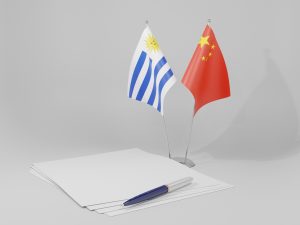Since democratization in 1988, newly elected presidents in Brazil strictly follow a tradition: The first trip abroad is always to Argentina, followed by Uruguay. The visit is usually surrounded by much pomp, congratulations and never-realized plans to transform Mercosur – a trade bloc that also includes Paraguay and Venezuela (suspended since 2016) – into the desired common market envisaged in the Treaty of Asuncion, signed in 1991.
Luiz Inacio “Lula” da Silva, who recently started his third term as Brazil’s president, enjoyed a friendly atmosphere in Buenos Aires at the end of January, but reality caught up with him in Montevideo. On the agenda with his center-right counterpart, Luis Lacalle Pou, was the difficult task of stopping Uruguay from pushing ahead with a trade deal with China.
With its disproportionately large industry, human capital, and available land compared to other South American nations, Uruguay has always demanded more autonomy from Mercosur. The main opposition is to the so-called Common External Tariff (TEC), imposed by all signatories to imports from outside the bloc. Reducing this tariff unilaterally goes against Article I of the Asuncion Treaty, which provides for joint negotiations on establishing “a common external tariff and the adoption of a common trade policy in relation to third States or groups of States.”
Since the 1990s, Montevideo has tried to circumvent this restriction a few times by negotiating a trade agreement with the United States, but was discouraged from doing so. Pou’s election in 2020, however, brought back calls for greater economic independence. Last year, the Uruguayans submitted Uruguay’s application to join the Trans-Pacific Partnership, ignoring warnings from neighbors about possible legal and trade action if they negotiate trade outside the bloc. Now China is the next big thing.
Plans for a free trade agreement with Beijing have been on Pou’s desk since at least 2021. After talks with Chinese President Xi Jinping, Pou directed officials from the Ministry of Commerce and Foreign Affairs to work with their Chinese counterparts on a feasibility study to be completed by July 2022, eventually creating room for progress in the negotiations. In interviews with the domestic press, he repeatedly complained about Mercosur’s protectionism and stressed Uruguay’s need to open up to the world.
Pou has a good point. Mercosur is indeed the fifth-most protectionist region in the world. In the more than 30 years since its creation, it has failed to consolidate itself as a relevant South American integration platform, and today it suffers from poor foreign trade figures. It is the integration bloc with the lowest foreign trade to GDP ratio (14.9 percent compared to the world average of 33 percent).
It is also true that Uruguay, as a smaller economy, has relied on its two larger partners, Brazil and Argentina, for too long. Both experienced periods of significant growth and political stability, but conditions were worsened by the gloomy economic indicators of the last decade.
Argentina recorded an inflation rate of 94.8 percent in 2022 – the highest rate in more than 30 years. It could break this record in 2023, when the figure is expected to reach 98 percent, according to local economists.
On the other hand, Brazil is in the midst of a perfect storm of political instability, meager growth, and the second highest real interest rate in the world. Lula has to live up to the expectations placed on his tenure, but he has been picking lost battles instead. Just as an example, in recent days, Lula railed against fiscal responsibility, hinting that he wants to review the autonomy of Brazil’s Central Bank, and his promised new formula for controlling public spending is yet to be revealed.
In theory, neither Lula nor Argentine President Alberto Hernandez oppose discussing a joint trade agreement with Beijing. The condition is to implement first the treaty signed with the EU, which is not yet sanctioned by the European members. In practice, however, it is unlikely that Mercosur would be able to consolidate any deals with the Chinese, as Paraguay has no relations with China and still recognizes Taiwan’s sovereignty. Moreover, the region is going through a significant phase of deindustrialization, and competition with Chinese industrial goods at lower prices poses a serious threat to the local economy.
Pou and Beijing are left with very few options. If it wants, Montevideo can continue negotiations and risk possible expulsion from Mercosur, which could lead to disputes with the neighborhood, but with much more significant diplomatic implications for the rest of the bloc. As for Beijing, they would need to deal with backlash in Argentina, the largest South American economy to join the Belt and Road Initiative, and Brazil, the country with the largest volume of Chinese investment in the world. Is it really productive to displease the main South American countries in a world increasingly hostile to the Chinese?
In this gamble, there is more at stake than just trade balance results.
































